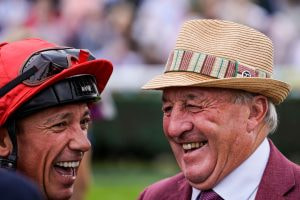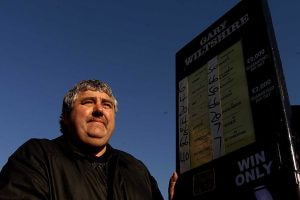England’s History at the Rugby World Cup
The 2023 Rugby World Cup gets under way on Friday (September 8) and runs until October 28 when England will be hoping to lift the famous Webb Ellis Cup for only the second time.
Here’s look back at their previous efforts to claim the trophy, including that famous success in 2003 and their three other final appearances.

Odds on England Winning the 2023 Rugby World Cup
So, what of England’s 2023 Rugby World Cup chances?
If you are a fan of the team, the news isn’t good – Steve Borthwick’s men are only the sixth favourites according to the RWC odds.
They are a best price of 16/1, with New Zealand – winners of this year’s southern-hemisphere Rugby Championship, the 3/1 market leaders.
Hosts France come next at 7/2, followed by holders South Africa (9/2) and Six Nations champions Ireland (5/1). Like England, Australia are considered long shots at 14/1. For more suggestions on what to bet on during the tournament, check out our Rugby World Cup betting preview.
1987
It wasn’t until 1987 that the first Rugby World Cup took place, the hosting rights being awarded to New Zealand and Australia.
England’s debut in the competition was a losing one as they went down 19-6 to Australia in Sydney, Mike Harrison scoring their only try as David Campese and co took control of Group A.
However, the Red Rose responded by beating Japan 60-7 – Harrison scoring a hat-trick – and USA 34-6 to reach the quarter-finals.
In the last eight, they would face neighbours Wales and began the match against injury-hit opponents as the favourites.
However, an error-strewn performance from England saw them well beaten. With the favourites poor in the scrum and the lineout, Wales fully deserved their 16-3 success, England’s only points coming from the boot of Jonathan Webb.
1991
England appeared to have a much better chance at the second Rugby World Cup having won the Grand Slam earlier in the year.
However, the draw did them few favours with reigning champions New Zealand their first opponents in the group stage. The All Blacks won 18-12 with England failing to score a try – that lack of creativity would prove a problem again.
As expected, Italy and USA were brushed aside as England finished second in the pool to set up a quarter-final with France in Paris.
The physical battle is probably best remembered for Jeremy Guscott’s defence-splitting run which set up a try for Rory Underwood to give England a 10-3 lead.
They were still in front in the closing stages when captain Will Carling crossed to secure a 19-10 victory. The win sent them into another lion’s den, namely Murrayfield, the following week.
A dour, kick-dominated contest followed, made famous by Gavin Hastings’ miss.
With score tied at 6-6, Hastings had what looked a simple penalty to put Scotland back in front. “There’s nobody on the England side, I’m sure, believes he’ll miss this one,” the commentator famously said, seconds before the fly-half sliced his effort wide.
Shortly afterwards, Rob Andrew dropped for goal and made it, sending England into their first-ever Rugby World Cup final.
This time they would have the Twickenham crowd behind them but any home advantage gained was handed back by misfiring tactics.
Strong forward play had helped get them to the final but England opted to play a more expansive game in the final and it didn’t work in a 12-6 loss.
Tony Daly scored the only try of the game in the first half and the Wallabies led 9-0 at the break.
With England stubbornly sticking to their original gameplan despite dominating up front, all they had to show for their second-half efforts were two penalties from Jonathan Webb.
1995
England made the semi-finals of the 1995 Rugby World Cup – and those who played in that game are probably still having nightmares about it.
It was the day in Cape Town when they were battered by a rampant Jonah Lomu as the New Zealand legend ran in four tries with a blistering display of power and pace.
The most famous try saw Lomu simply run through Mike Catt’s attempt to stop him as New Zealand surged to a 45-29 win.
Earlier, England had topped their pool, albeit unconvincingly, failing to score a try in their 24-18 win over Argentina, edging past Italy 27-20 before seeing off Western Samoa 44-22.
That set up a repeat of the 1991 final against Australia, a game that proved to be a thriller. Tony Underwood’s try gave England a first-half advantage but the game soon became a kicking battle between Rob Andrew and Michael Lynagh.
Both men kicked five penalties and a conversion but, with the clock having reached 80 minutes, Andrew settled the contest with a terrific 45-metre drop goal, but the elation would soon be punctured by Lomu.
1999
England had to qualify for the 1999 edition, the first of the professional era. It is the only time they have not made it in automatically.
They began the tournament with a 67-7 demolition of Italy. The big pool game brought disappointment as New Zealand won 30-16 at Twickenham but they stayed alive by thrashing Tonga 101-10, a game which saw Paul Grayson score 36 points.
A midweek play-off win over Fiji booked a quarter-final date with reigning champions South Africa in Paris.
More fatigued following their extra game, England actually moved 12-6 up inside 20 minutes but Joost van der Westhuizen’s try put South Africa ahead at half time.
Despite being tryless and reliant on the kicking of Grayson and Jonny Wilkinson, England were still within four points with 10 minutes to go but then folded as Jannie de Beer’s fourth and fifth drop goals, plus a try from Pieter Rossouw dumped England out.
2003
England’s 2003 vintage made legends of themselves with victory Down Under – who could forget Jonny Wilkinson’s winning drop goal?
Having seen a 14-5 half-time lead against Australia disappear and then lose the lead again with just two minutes of extra time remaining, England managed to get the ball to their dead-eye talisman within range.
And with just 28 seconds left on the clock, Wilkinson slotted home drop with his right foot – not his regular kicking side – to spark jubilant celebrations.
Soon after, the giant hand of captain Martin Johnson was lifting the Webb Ellis Cup – the first Englishman to do so.
While England’s victory was certainly dramatic, it did not come as a shock.
Coach Clive Woodward had drilled his team into a winning machine and in the run-up to the tournament they had won 14 matches in a row, most notably recording their first-ever victory in Australia and just their second win in New Zealand.
They began the competition by battering Georgia and laid down a real marker with a 25-6 victory over South Africa, one which remains their only World Cup win over the Springboks.
Samoa were also beaten in the pool, which ended with a 111-13 demolition of Uruguay.
A quarter-final scare was survived – Wales led 10-3 at half time before Jason Robinson’s try sparked a comeback and a 28-17 win.
The semi-final against France was ruined, at least as a spectacle, by the weather but England got the result they craved.
It became a kicking contest, one won by Wilkinson who nailed five penalties and three drop goals in a 24-7 win. In contrast, France’s Frederic Michalak made just one of his five attempts.
The final against the hosts was set and the match saw a cracking try from Robinson but it all got lost in the drama that followed, the image of Wilkinson slotting that drop goal etched in the memory instead.
2007
If England’s 2003 victory could have been predicted, 2007 run to the final could not.
After home defeats to New Zealand, Argentina and South Africa in the autumn of 2006, coach Andy Robinson was axed and replaced by Brian Ashton.
Still, England could finish only third in the Six Nations, were crushed on their tour of South Africa and two defeats to France on the eve of the tournament meant Ashton’s men were being largely written off.
Things only got worse when they were humbled 36-0 by South Africa in the pool stage, the only time England have been shutout in a RWC match.
It is said a player revolt followed and that tactics subsequently came from the men on the pitch, not in the stands.
Jonny Wilkinson’s return from injury certainly helped as the fightback began as first Samoa and then Tonga were seen off.
Wilkinson kicked his side to a 12-10 quarter-final victory over Australia as England dominated up front and a similar performance saw them topple hosts France 14-9, aided by Josh Lewsey’s try after just 79 seconds.
The final brought the inevitable rematch with South Africa and while it was a much closer affair, it ultimately had the same result.
The Springboks emerged 15-6 winners, all the points coming from the boot as England were left to reflect on Mark Cueto’s disallowed try.
2011
Eight years on from lifting the trophy as captain, Martin Johnson was at the England helm as head coach, leading the team in New Zealand.
It would not be so memorable – at least not on the pitch.
Instead, the campaign was marred by off-field incidents, from Manu Tuilagi jumping off a ferry in his pants and alcohol-fuelled nights out to the alleged harassment of a hotel worker.
As for the rugby, England won all four group games but the crucial matches were only won narrowly – Argentina and Scotland beaten by just four points each.
England would still have hoped to get the better of a France side who had lost twice in their pool but they were 16-0 down after only 31 minutes of the quarter-final, a gap which proved too wide to bridge.
Ben Foden’s try and Jonny Wilkinson’s conversion – the final points of his record-breaking World Cup career – reduced the arrears and there was still some hope when Mark Cueto cut the deficit to seven points late on, but it was not to be.
2015
If Johnson’s reign had been disappointing, Stuart Lancaster’s was worse.
England became the first RWC host nation to be knocked out in the group stage following defeats to Wales and Australia.
The real damage was done against the injury-hit Welsh, who trailed 19-9 before producing a stunning comeback.
It was sealed late on, Lloyd Williams, a scrum-half playing on the wing due to those injuries, kicking cross-field to set up Gareth Davies for a try.
Dan Biggar’s conversion tied the score and the stand-in fly-half then booted the game-winning penalty from almost halfway to complete a perfect day of eight successful kicks from eight attempts.
That left England needing to beat Australia and that never looked likely, the hosts beaten 33-13 as Bernard Foley helped himself to two tries and a 28-point haul.
The crazy decision to stage the draw three years prior had worked against England – by the time the tournament arrived, three of the world’s top four were in Pool A.
2019
The Rugby World Cup broke new ground in 2019, heading to Japan for what turned out to be a memorable tournament.
Coached by Australian Eddie Jones, England certainly played their part.
They topped what was a routine group after their final match against France was cancelled due to a typhoon, the points being shared.
In the quarter-finals, too many errors from Australia saw England ease to a 40-16 victory but they were big underdogs for the semi-final against reigning champs New Zealand in the last four.
The famous match began with England facing down the All Blacks’ haka in a V formation. Maybe it gave them an edge – England certainly made a flying start with Manu Tuilagi crossing the tryline after just two minutes.
New Zealand were shut out in the first half and trailed 10-0 at the break as England dominated the set-piece and the breakdown.
The All Blacks got back within six points at 13-7 but two more penalties from George Ford saw England to their first World Cup win over New Zealand.
It set up a repeat of the 2007 final against South Africa but that would prove a step too far.
The Springboks overpowered England, dominating the scrum.
12-6 up at half time, South Africa added two tries in an impressive second half with England’s only points coming from the boot of Owen Farrell.
Rugby World Cup stats and facts: England
• Jonny Wilkinson has scored more Rugby World Cup points (277) than any other player in the competition’s history. He also holds the records for penalties (58) and drop goals (14).
• Wilkinson’s 2003 tally of 113 points has only been bettered once (by New Zealand’s Grant Fox in 1987).
• Wilkinson is the only player to score in two RWC finals (2003 & 2007).
• Paul Grayson’s 36-point tally against Tonga in 1999 remains an England RWC high.
• No-one has played in more RWC matches than England’s Justin Leonard. He made his 22nd appearance in the 2003 final and now shares the record with All Black Richie McCaw.
• England’s highest points total in a single game came in a 111-13 win over Uruguay in 2003. Josh Lewsey scored five tries in that match – the most by an Englishman in a RWC contest.
• The top tryscorer prize has only been won by an Englishman once – Chris Ashton (jointly) in 2011.



